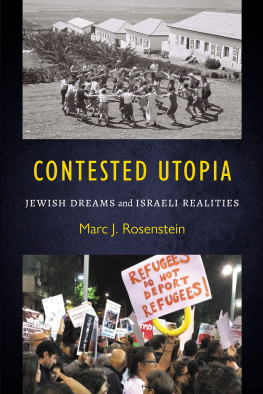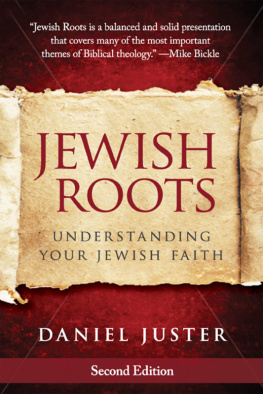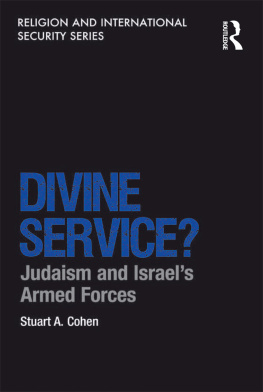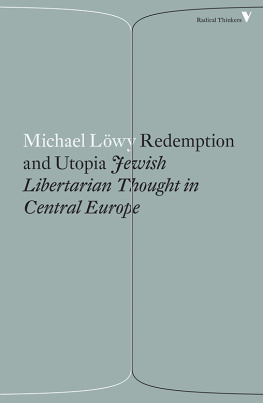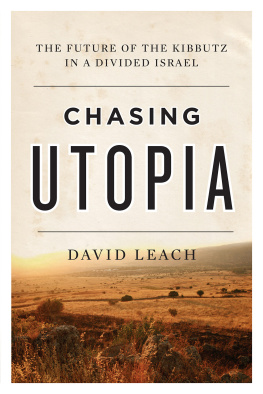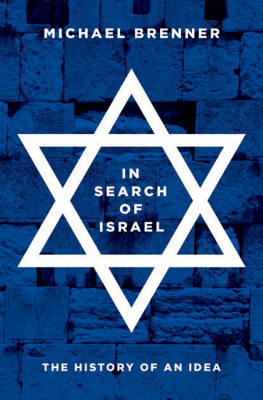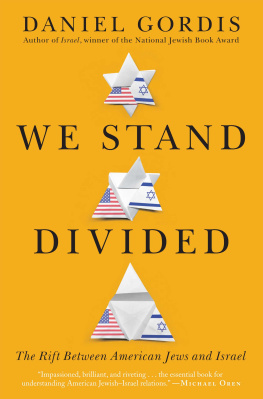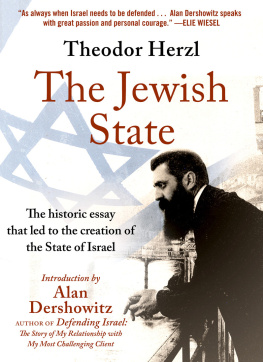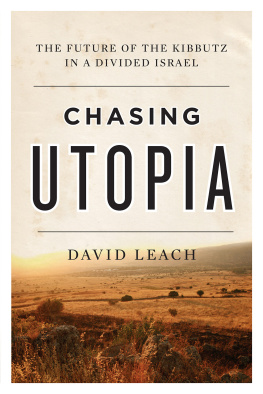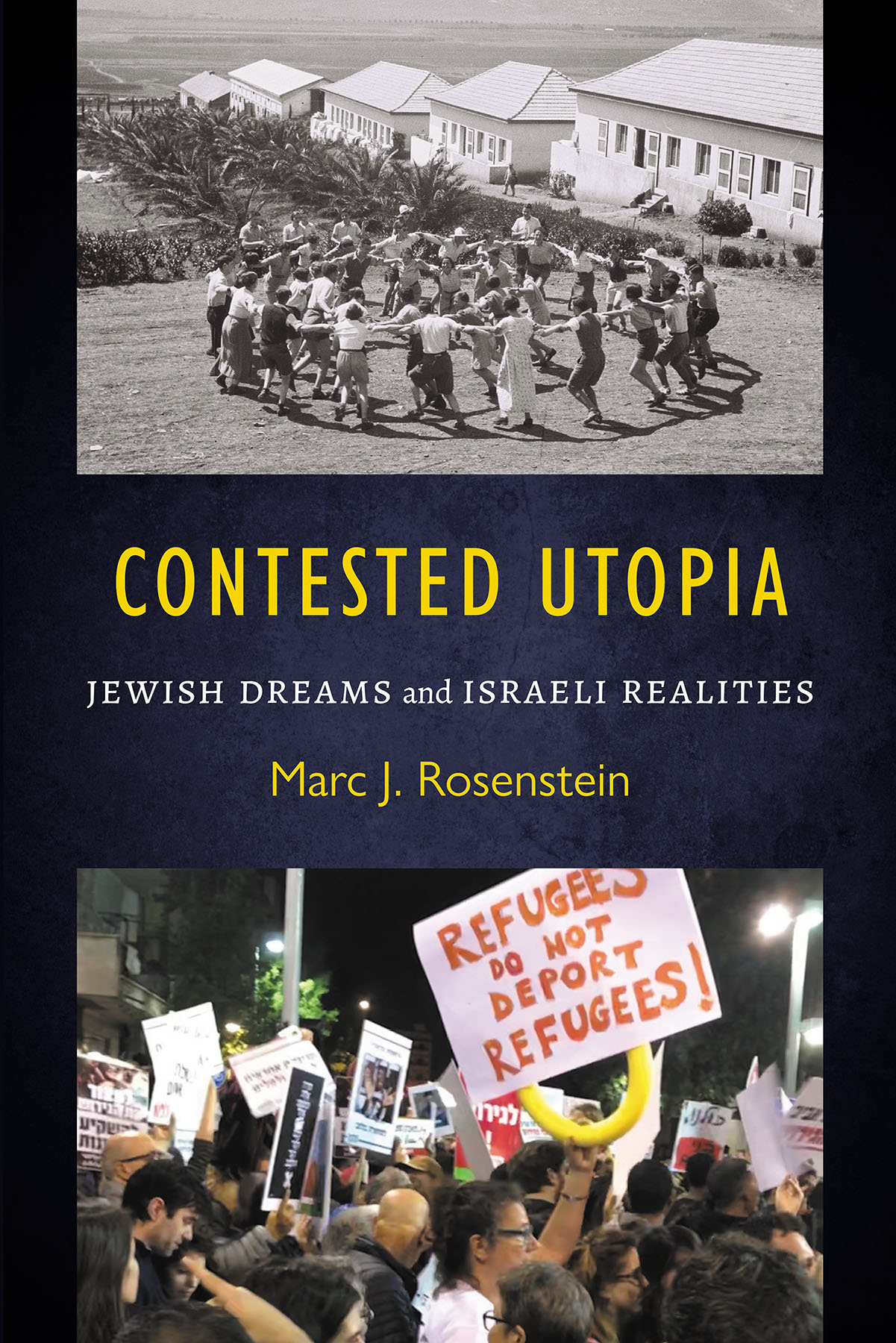
In this fascinating study of the utopian roots within both traditional Judaism and Zionism, Rosenstein offers a lens into the identity struggles of the modern Jewish state. An important contribution to the Israeli bookshelf.
Yossi Klein Halevi, author of Like Dreamers
Rosenstein takes readers on a stimulating excursion through a fascinating cluster of utopian visions that anticipated what subsequently became the State of Israel. His juxtaposition of these competing versions of what might be with the realities that emerged is well worth pondering.
Deborah Dash Moore, professor of Judaic Studies, University of Michigan
Contested Utopia will help to shape discourse around the future of the Jewish state for a long time.
Rabbi Lisa Grant, director, Rabbinical Program, Hebrew Union CollegeJewish Institute of Religion, New York
Contested Utopia
Jewish Dreams and Israeli Realities
Marc J. Rosenstein

The Jewish Publication Society | Philadelphia
University of Nebraska Press | Lincoln
2021 by Marc J. Rosenstein
Cover designed by University of Nebraska Press; cover images: (top) Zoltan Kluger / Israel Government Press Office, (bottom) Miriam Herschlag / The Times of Israel.
Author photo courtesy of the author.
Grateful acknowledgment for use of the following: Asaf Yedidya, Chadash Mi-lo Yashan: Ha-utopia Hagenuza shel Zeev Yaavetz [New from the Not Old: Zev Yavetzs Unpublished Utopia]. Cathedra 148 (June 2013): 11048. By permission of Yad Ben Zvi. Meir Or, Rosh Hashana Bakfar [Rosh Hashanah in the Village] Batira 2 (1950): 13. By permission of Reuven Or, Kibbutz Tirat Zvi. Mark Zborowski and Elizabeth Herzog, Life Is with People (New York: Schocken, 1969), 21632. Siegfried Lehman, Raayon Vehagshamah [Idea and Realization], edited by Abraham Yakel. (Tel Aviv: Tarbut Vechinuch, 1962), 11315. By permission of Ada Lehman-Schair. Jabotinsky, Vladimir. Tristan da Runha. In A Pocket Edition of Several Stories Mostly Reactionary, 141202. Paris: n.p., 1925. By permission of the Jabotinsky Institute. Theodor Herzl, Old New Land, trans. Lotta Levensohn (Princeton: Wiener, 1997), 29251. By permission of the publisher.
All rights reserved. Published by the University of Nebraska Press as a Jewish Publication Society book.
Library of Congress Cataloging-in-Publication Data
Names: Rosenstein, Marc, 1946 author.
Title: Contested utopia: Jewish dreams and Israeli realities / Marc J. Rosenstein.
Description: Lincoln: University of Nebraska Press; Philadelphia: The Jewish Publication Society, 2021. | Includes bibliographical references and index.
Identifiers: LCCN 2020031223
ISBN 9780827614727 (paperback)
ISBN 9780827618633 (epub)
ISBN 9780827618640 (mobi)
ISBN 9780827618657 (pdf)
Subjects: LCSH : Zionism and Judaism. | UtopiasReligious aspectsJudaism | ZionismHistory. | IsraelHistory.
Classification: LCC DS 149 . R 6278 2021 | DDC 320.54095694dc23
LC record available at https://lccn.loc.gov/2020031223
The publisher does not have any control over and does not assume any responsibility for author or third-party websites or their content.
To my children
Joshua, Ilana, and Lev
Rabbi Tarfon said:
It is not for you to complete the work, but neither are you free to desist from it.
Mishnah Avot 2:16
Contents
Envisioning a Jewish State
If you had a magic wand and could create the ideal Jewish state, with no outside constraints, what would it look like? How would it be governed? Where would its borders lie? What would be the status of religion? Of minorities? Of immigrants? What policies would it enact in social welfare? Environment? Education? What would be uniquely Jewish about it?
In the course of my career as a tour educator, facilitator, and lecturer on Israel, I have stood in front of hundreds of groupsdiaspora Jews and Israelis, youth, students, teachers, clergy, ordinary touristsand posed that challenge. While the response is often an awkward silence, sometimes suggestions are ventured: Jewish state means a state
- with a Jewish majority
- where Jewish culture is dominant
- governed by Jewish law
- where Jews, as a nation, have political sovereignty and military power
- whose behavior conforms to Jewish values
- where Jews are more equal than others
- as envisioned in biblical prophecy
- where the Jews can live normally
- where Judaism is the established religion
- where life has a Jewish flavor
- existing within biblical borders
Alas, suggestions such as these raise more questions than they answer. For example: Who counts as a Jew in judging a Jewish majority? Who is authorized to determine Jewish law? Where are Israels biblical borders? What are Jewish values and who determines them? What is normal?
Moreover, while some of these definitions dovetail, others seem to conflict with each other. For example, can a normal state base its policies and borders on biblical revelation? Or can a modern sovereign state be ruled by a legal system based on life in a nonsovereign, minority community?
These and other uncertainties and inconsistencies bedevil any attempt to reach a clear, consistent consensus on what the ideal Jewish state should look like. It seems everyone has an opinion about what is wonderfuland what is distressingabout Israel as it is, but we rarely pull back from advocacy and criticism to reflect on what we really mean when we say Jewish state. On the one hand, this lack of a clear vision has enabled a broad-based common effort to build and sustain the State of Israel, despite deep ideological divisions. On the other hand, those divisions have made it impossible to resolve fundamental questions such as borders, relations with neighbors, minorities status, the public role of religion, and immigration policy.
I believe that with the passing of time, the costs of not having a shared guiding vision have come to outweigh the benefits of consensual vagueness. Indeed, it is not far-fetched to suggest that the increasingly strident polarization of public discourse might actually pose a threat to Israels survival.
Several years ago it occurred to me that it was unfair to challenge others to envision a Jewish state if I couldnt do so myself, so I undertook to try. As I explored the sources, I discovered that over the course of its history, the Jewish people has articulated several different visions of the ideal Jewish state. Some of these were consonant with each other; some were dissonant. As I examined these images more closely, I kept finding myself returning to the idea of utopia. From Abraham to the present, it seems that the Jewish people has never stopped imagining a more perfect place than the present location, a more perfect existence than our present experience. These images have always been based on promises, dreams, values, memoriesand current realities. In providing inspiration and sustenance, they have become central pillars of individual and collective Jewish identity.
In the past two centuries, forces of secularism and nationalism have placed these images in a new context, blurring the boundaries formerly taken for granted: boundaries between inspiration and aspiration, between guiding principles and concrete action plans, between utopian dreams and facts on the ground.
Next page
